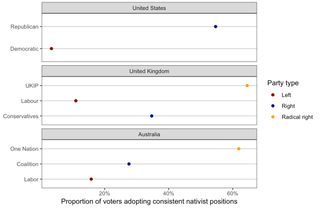Queensland Senator Fraser Anning’s widely condemned call for a “final solution” to the Australia’s “immigration problem” on Tuesday should not be viewed in isolation. While his rhetoric was stronger than what we’re used to hearing from mainstream politicians, his message that immigration is a problem is reflective of the views of almost one quarter of voters in Australia who have strong nativist views, similar to those found in the United States and United Kingdom.
Locally, the immigration debate has prompted concerns over housing and infrastructure, and the role of African migrants in gang crime.
In the United States, Donald Trump — as a candidate and now as president — has consistently made his opposition to immigration the centre of his politics, with his family separation policy, Muslim “travel ban”, and the threat of a government shutdown if Congress doesn’t fund a border wall with Mexico.
In the United Kingdom, immigration has been central to the debate over Brexit.
What separates these countries, however, is how public attitudes about immigration are far more polarised along party lines in the United States.
Part of this has to do with Trump’s embrace of anti-immigration policies, which has prompted Democratic voters to move left on the issue. But it also reflects differences in the three countries’ party systems. In the United Kingdom and Australia, citizens with strong nativist sentiments have found a home in far-right third parties, whereas in the United States, lacking viable minor party options, strongly anti-immigrant voters mostly identify with the Republican Party.
The survey
This conclusion comes from a series of studies we conducted in late June and early July in the United States, the United Kingdom, and Australia. The nationally-representative surveys were carried out by YouGov, and had sample sizes ranging from between 1,010 and 2,002 in each country.
Respondents were asked a series of questions designed to tap what scholars refer to as “nativism”, or attitudes that indicate opposition to immigration. We asked whether they agreed that (1) immigrants take jobs away from people born in the country; (2) things would be worse if all immigrants who wanted to come were allowed in; and (3) assimilation of migrants to local culture and traditions was important. We define “nativists” as individuals who agreed to all three of these statements.
Overall, the level of nativism in the United States, United Kingdom and Australia were virtually identical. It was 23 per cent of US respondents, 22 per cent of UK respondents and 24 per cent of Australian respondents.
Wide gaps in nativism between Republican and Democratic voters
But when we looked at which parties nativists support, we found different patterns. There is a large disparity between the share of nativists that make up Democratic and Republican voters.
According to our data, 55 per cent of Republican voters are nativists, while just three per cent of Democrats are. In particular, Republican voters held very sceptical views on questions concerning immigrants as an economic threat and whether the United States should allow all migrants who wish to come to the country to do so.
At the same time, voters in the Democratic Party are even more supportive of immigration than supporters of the centre-left parties in the United Kingdom and Australia. This is at least partly a backlash against President Trump’s strong anti-immigration positions, as Democrats have become more pro-immigration since Trump took office.
Proportion of nativists in each party

The level of nativism in the Republican party looks a lot more like the anti-immigrant sentiment in the radical-right United Kingdom Independence Party and One Nation Party in Australia than the centre-right parties in those countries.
What this means for immigration politics and the parties
This pattern underscores the extent to which President Trump’s anti-immigrant sentiment has become reflected among Republican voters. And it also suggests that the absence of viable third parties in the United States has served to channel anti-immigrant sentiment into the Republican Party.
In the United Kingdom and Australia, however, those with strong anti-immigrant views have drifted away from the mainstream parties and instead provided support to radical right parties, which are influential, but have thus far been locked out of government.
But the demand for parties with nativist policy positions remains strong in these countries and the capacity of the mainstream parties to hold the nativists back is debatable. In Australia the centre-right has frequently flirted with the idea of working with the radical right, while in the United Kingdom the centre-right already contains representatives with nativist views who supported withdrawal from the European Union.
The electoral landscape in both countries is also looking increasingly fragmented. It is not out of the question that the centre-right parties in both countries increasingly look to reabsorb some of the nativists voting for the radical right back under their umbrella, pushing them closer to the current situation in the Republican Party.
Survey results
Immigrants take jobs away from people born in the country
|
Response |
US (%) |
UK (%) |
Australia (%) |
|
Strongly agree |
20 |
13 |
17 |
|
Agree |
27 |
28 |
33 |
|
Disagree |
27 |
40 |
36 |
|
Strongly disagree |
26 |
19 |
14 |
The country would be better off if we let in all immigrants who wanted to come here
|
Response |
US (%) |
UK (%) |
Australia (%) |
|
Strongly agree |
9 |
3 |
5 |
|
Agree |
22 |
13 |
18 |
|
Disagree |
30 |
43 |
35 |
|
Strongly disagree |
39 |
42 |
42 |
How important is it that immigrants assimilate to our culture and traditions?
|
Response |
US (%) |
UK (%) |
Australia (%) |
|
Extremely important |
25 |
27 |
34 |
|
Very important |
24 |
31 |
29 |
|
Moderately important |
26 |
27 |
25 |
|
Slightly important |
15 |
9 |
7 |
|
Not at all important |
10 |
5 |
4 |
The nativist composition of each countries’ electorates
|
Country |
Per cent nativist |
|
United States |
22.86 |
|
United Kingdom |
22.41 |
|
Australia |
23.81 |
Nativists here are those respondents who consistently agreed with the nativist propositions: that immigrants take jobs from the local born, immigration should be restricted, and that assimilation was very or extremely important to them.
Background to the USSC-YouGov poll
In September 2017, the United States Studies Centre announced that it had partnered with global survey company YouGov, which now provides the Centre with exclusive, monthly polling data from the United States and Australia; tracking perceptions of political leadership in both countries, and unique, targeted insights on a diverse range of topics.
CEO of the United States Studies Centre Professor Simon Jackman, a leader in public opinion research, has previously worked as one of the principal investigators of the American National Election Studies and partnered with media outlets including the Guardian Australia and the Huffington Post on pre-election polling. He said the results provided by YouGov as part of the new partnership will allow the Centre to analyse and publish unprecedented comparative data.
“The United States Studies Centre has taken a keen interest in the attitudes and opinions of people in our region, with research like our surveys into America’s role in the Indo-Pacific. This exciting new partnership with YouGov gives us the opportunity to broaden that focus to public opinion in the United States and then contrast that with the views of people in our own backyard,” Jackman said. “The Centre has a mandate to deepen Australia’s understanding of America. This ongoing commitment to charting public perceptions in both countries is an ideal way for Australians to gain perspective on the United States.”
YouGov is a market research and opinion polling company headquartered in the United Kingdom, with operations in Europe, North America, the Middle East and the Asia-Pacific.






